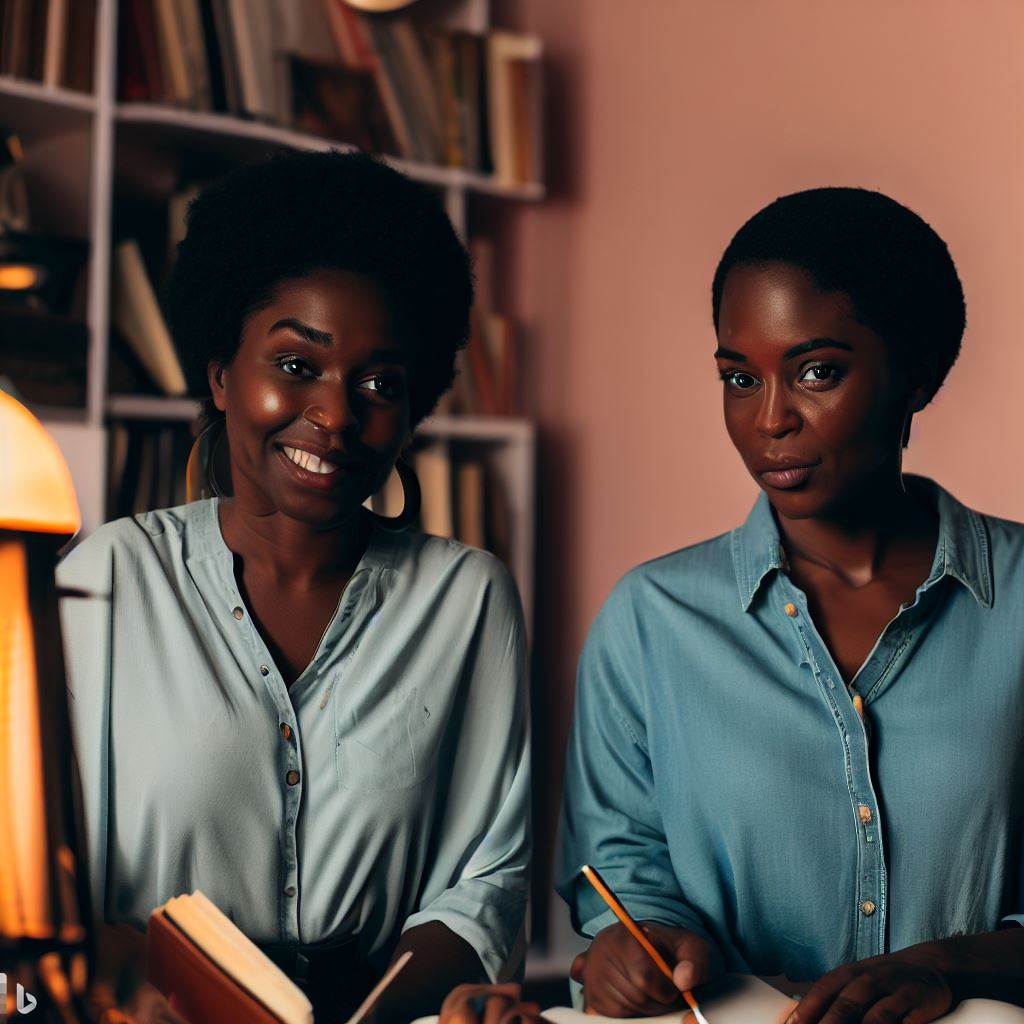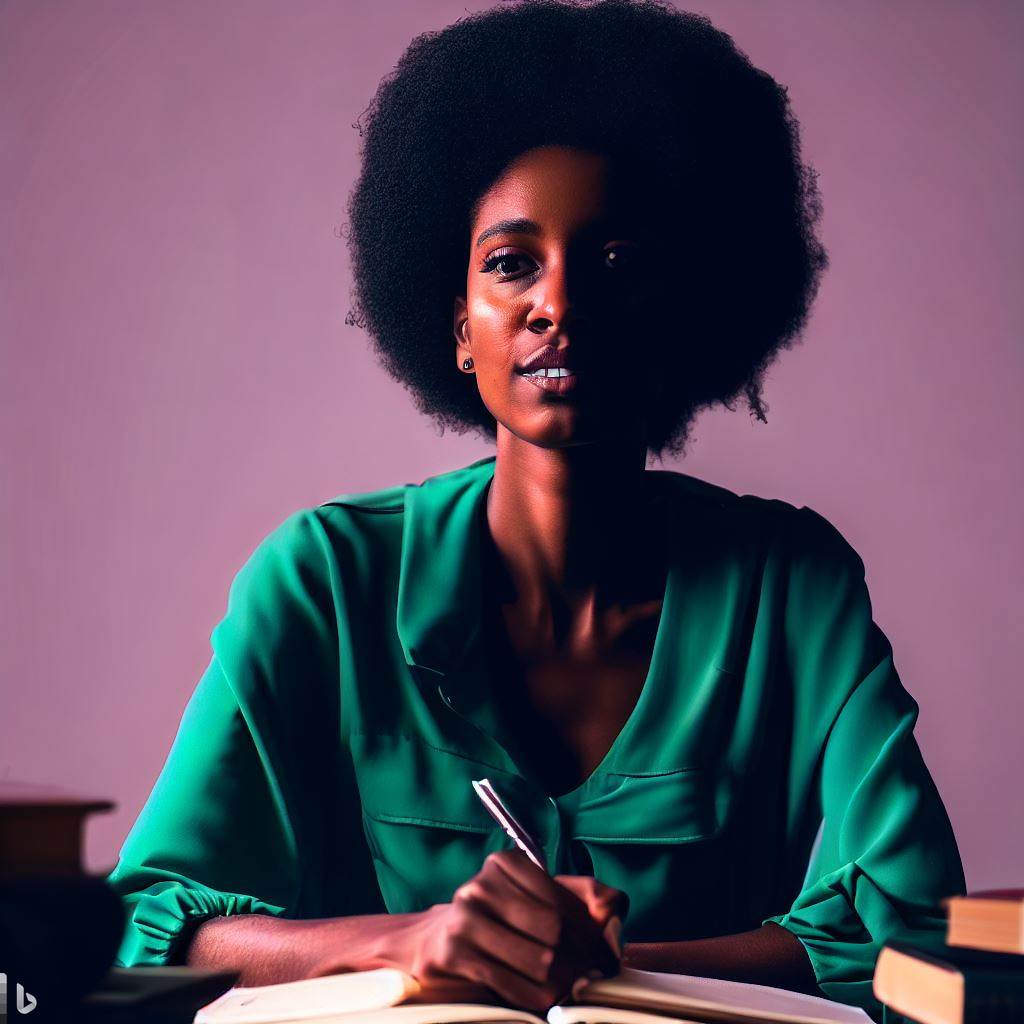Introduction
Nigeria, a country rich in cultural diversity and literary traditions, has witnessed remarkable contributions from its female authors.
These women writers have paved the way for future generations, defying societal norms and challenging gender stereotypes.
By profiling Nigerian female authors, we acknowledge their invaluable contributions to literature and provide a platform to amplify their voices.
Recognizing their struggles and achievements is crucial in promoting gender equality and fostering a more inclusive literary community.
Nigerian female authors face numerous challenges, from societal expectations to limited access to publishing opportunities.
Despite these obstacles, they persist, using their words to create literary masterpieces that explore themes of identity, feminism, and social justice.
Through their works, Nigerian female authors have made a significant impact on the literary landscape, both within Nigeria and on an international scale.
These writers have opened new doors and challenged mainstream narratives, enriching the literary world with their unique perspectives.
This blog post will delve into the lives and works of notable Nigerian female authors, such as Chimamanda Ngozi Adichie, Buchi Emecheta, and Adaobi Tricia Nwaubani.
It will explore the themes they tackle, the accolades they have received, and the barriers they have overcome.
In shedding light on the contributions and challenges of Nigerian female authors, this blog post aims to elevate their voices and inspire future generations of female writers.
By celebrating their achievements, we hope to create a more inclusive and diverse literary landscape that empowers women in the world of writing.
Historical context of women in Nigerian literature
Brief overview of Nigerian literature
Nigerian literature dates back to the pre-colonial era, consisting of oral traditions and folklore passed down from generation to generation.
It was primarily dominated by men, who were the prominent voices in storytelling and writing.
Role of women in early Nigerian literature
In the early years of Nigerian literature, women faced significant marginalization and were largely excluded from the literary scene.
Their voices were silenced, and their stories were disregarded, resulting in a lack of female representation in published works.
Challenges faced by female authors in the past
Female authors in Nigeria encountered numerous challenges that hindered their participation in the literary world.
Societal expectations placed a greater emphasis on women’s domestic roles, limiting their opportunities for education and creative expression.
1. Limited access to education
Women in Nigeria historically had limited access to education, which greatly affected their ability to read, write, and participate in literary activities.
Education was primarily reserved for men, leaving women at a disadvantage in pursuing literary endeavors.
2. Cultural stereotypes and gender roles
Cultural stereotypes and predefined gender roles further marginalized women writers. Society often viewed women as caretakers and nurturers rather than intellectuals or creative artists.
This perception hindered their recognition as serious authors.
3. Lack of publishing opportunities
Female authors also faced challenges when it came to publishing their works.
Publishing houses were often hesitant to invest in women’s writing, as they believed it would not appeal to a broader audience or be financially profitable.
4. Male-dominated literary circles
The dominance of male writers within literary circles further marginalized female authors.
Men held positions of power and influence, making it difficult for women to break into the industry and have their works recognized.
5. Limited platforms for expression
Women lacked platforms to share their stories and perspectives openly.
The absence of literary magazines, publishing houses, and literary events dedicated to women’s work left them fighting for representation and visibility.
Despite these challenges, there were trailblazing Nigerian female authors who managed to overcome societal barriers and make their mark in Nigerian literature.
These pioneering women paved the way for future generations of female authors.
In the end, the historical context of women in Nigerian literature reveals their marginalization and challenges faced in the past.
Limited access to education, cultural stereotypes, and gender roles, lack of publishing opportunities, male-dominated literary circles, and limited platforms for expression were among the obstacles they had to overcome.
However, their resilience and determination have led to the recognition and celebration of Nigerian female authors today.
Read: How to Become a Cruise Ship Entertainer in Nigeria
Rise of Nigerian female authors
Emergence of prominent Nigerian female authors
- Chimamanda Ngozi Adichie: Known for her powerful storytelling, Adichie has become a global literary icon.
- Buchi Emecheta: Emecheta’s works depict the struggles of Nigerian women in a patriarchal society.
- Adaobi Tricia Nwaubani: Nwaubani’s debut novel, “I Do Not Come to You By Chance,” gained international acclaim.
- Sefi Atta: Atta’s writing explores themes of identity, culture, and politics in contemporary Nigeria.
Influence of Chinua Achebe’s “Things Fall Apart” on female writers
- Achebe’s groundbreaking novel paved the way for Nigerian female authors by bringing Nigerian literature to the forefront.
- “Things Fall Apart” challenged traditional gender roles, inspiring female writers to explore their own narratives.
- Achebe’s authentic portrayal of Nigerian culture encouraged female authors to embrace their heritage in their writing.
- Female writers found empowerment in Achebe’s portrayal of strong female characters, defying societal expectations.
Role of literary organizations in promoting Nigerian female authors
- Association of Nigerian Authors (ANA): ANA creates platforms for female authors to showcase their work and network.
- Women Writers of Nigeria (WRITA): WRITA provides a supportive community for female writers to develop their craft.
- Farafina Trust: Through writing workshops and mentorship programs, Farafina Trust nurtures and promotes Nigerian female authors.
These organizations organize literary festivals, book launches, and writing competitions to highlight female authors’ works.
In fact, Nigerian female authors have played a significant role in shaping the literary landscape of Nigeria and beyond.
Prominent writers like Chimamanda Ngozi Adichie, Buchi Emecheta, Adaobi Tricia Nwaubani, and Sefi Atta have captivated readers with their compelling stories.
Chinua Achebe’s “Things Fall Apart” served as a catalyst, challenging traditional gender roles and inspiring female writers to share their unique perspectives.
Additionally, literary organizations like ANA, WRITA, and Farafina Trust have contributed to the promotion and support of Nigerian female authors.
Through their collective efforts, these talented writers continue to enrich the literary world with their powerful voices and narratives.
Read: Writing for Social Change: The Nigerian Experience
Profiling Nigerian female authors
1. Chimamanda Ngozi Adichie: Background, notable works, and influence
Chimamanda Ngozi Adichie, celebrated Nigerian author, weaves potent narratives, highlighting feminism’s prominence, through her impactful storytelling.
Born in Enugu, Nigeria in 1977, Adichie’s works have had a significant impact on the literary world. With her unique voice and ability to explore complex themes, she has gained a loyal following.
Adichie’s notable works include her debut novel, “Purple Hibiscus,” which earned her critical acclaim and multiple awards.
She later went on to write “Half of a Yellow Sun,” which won the Orange Prize for Fiction in 2007. This novel delves into the Nigerian Civil War and showcases Adichie’s exceptional storytelling skills.
Beyond her novels, Adichie is also known for her influential TED Talk, “We Should All Be Feminists.” Millions watched the talk, igniting global gender equality discussions and fostering crucial dialogs.
Adichie’s influence extends beyond her writing, as she continues to be an advocate for equality and justice.
2. Sefi Atta: Background, notable works, and influence
Sefi Atta is another remarkable Nigerian female author who has made significant contributions to the literary scene.
Born in Lagos, Nigeria in 1964, Atta’s works often explore themes such as identity, gender, and politics in Nigeria. Her writing style is characterized by its vivid imagery and rich storytelling.
Atta’s notable works include her debut novel, “Everything Good Will Come,” which won the Wole Soyinka Prize for Literature in Africa.
This novel depicts the struggles and triumphs of a young Nigerian girl growing up in the tumultuous 1970s. Atta’s ability to capture the essence of Nigerian society has earned her critical acclaim.
In addition to her novels, Atta has also written several plays, short stories, and essays. Her works have been published internationally and have gained recognition for their insightful portrayal of Nigerian culture.
Atta’s impact on Nigerian literature remains profound, continually motivating emerging writers within the nation’s borders.
3. Lola Shoneyin: Background, notable works, and influence
Lola Shoneyin is a prominent Nigerian author, poet, and feminist. Born in Ibadan, Nigeria in 1974, Shoneyin’s works explore themes such as love, sexuality, and feminism in Nigerian society.
Her poetry and novels have garnered international recognition and have made a lasting impact.
One of Shoneyin’s notable works is her debut novel, “The Secret Lives of Baba Segi’s Wives.” This novel delves into the intricacies of polygamy in Nigeria and challenges societal norms.
Shoneyin’s ability to tackle sensitive topics with grace and sensitivity has been widely appreciated.
Besides her novels, Shoneyin is also known for her poetry collections, such as “So All the Time I Was Sitting on an Egg.”
Her poetry eloquently captures the complexities of womanhood and the Nigerian experience. Shoneyin’s contribution to Nigerian literature and feminism has earned her numerous accolades.
In essence, Nigerian female authors like Chimamanda Ngozi Adichie, Sefi Atta, and Lola Shoneyin have made significant contributions to the literary world.
Their unique voices, powerful storytelling, and exploration of important themes have captivated readers and sparked important conversations.
These authors continue to inspire and pave the way for aspiring female writers in Nigeria and beyond.
Read: The Challenges Cruise Ship Entertainers Face in Nigeria

Challenges faced by Nigerian female authors
Gender bias within the literary industry
- Female authors are often marginalized and their work is seen as less valuable.
- They face discrimination in terms of awards, recognition, and review space.
- Publishers and editors may have preconceived notions about what women should write about.
- Women’s stories are often not given equal attention and are deemed less marketable.
- Male authors receive more attention and opportunities in terms of book deals and promotions.
Limited publishing opportunities and resources
- Female authors struggle to find publishers willing to take risks on their work.
- They may face rejection based on gender, with publishers favoring male authors.
- Nigerian publishing industry is male-dominated, making it harder for women to break in.
- Access to resources such as funding and mentorship programs is limited for female authors.
- Women may have to invest more time and effort in finding and securing publishing opportunities.
Balancing writing careers with societal expectations
- Women are often expected to prioritize family responsibilities over their writing careers.
- Societal expectations may limit the time and energy women can dedicate to writing.
- Female authors may struggle to find support for their writing aspirations from their families.
- They may feel pressure to conform to traditional gender roles instead of pursuing their writing dreams.
- Juggling multiple roles can lead to burnout and hinder creative output for female authors.
In a nutshell, Nigerian female authors face numerous challenges within the literary industry.
Gender bias, limited publishing opportunities, and the struggle to balance societal expectations all contribute to the difficulties they encounter.
However, despite these challenges, Nigerian female authors continue to produce remarkable literary works, showcasing their talent and resilience.
We must strive to tackle challenges, fostering inclusive, supportive writing environments for women.
Read: Creative Writing in Nigeria: Scope and Opportunities
Success stories and achievements of Nigerian female authors
International recognition and awards
- Chimamanda Ngozi Adichie’s novel “Half of a Yellow Sun” won the Orange Prize for Fiction.
- Buchi Emecheta received the Order of the British Empire in recognition of her contributions to literature.
- Helon Habila’s novel “Waiting for an Angel” won the Commonwealth Writers’ Prize for Best First Book.
- Adaobi Tricia Nwaubani’s debut novel “I Do Not Come to You by Chance” won the Commonwealth Writers’ Prize for Best First Book.
- Sefi Atta’s novel “Everything Good Will Come” was shortlisted for the Wole Soyinka Prize for Literature in Africa.
Literary contributions to Nigerian identity and cultural preservation
- Chimamanda Ngozi Adichie’s “Purple Hibiscus” explores themes of family, tradition, and postcolonial Nigeria.
- Buchi Emecheta’s “The Joys of Motherhood” examines the challenges faced by Nigerian women in a changing society.
- Flora Nwapa’s “Efuru” is considered the first novel published by a Nigerian woman, paving the way for future female authors.
- Adaora Lily Ulasi’s “The Night-Hawker” portrays the struggles of a young Nigerian girl growing up in a patriarchal society.
- Chika Unigwe’s “On Black Sisters Street” delves into the lives of Nigerian women working as prostitutes in Antwerp, Belgium.
Influence on the empowerment of Nigerian women
- Chimamanda Ngozi Adichie’s TED talk “We Should All Be Feminists” became a global phenomenon, inspiring women worldwide.
- Chimamanda Ngozi Adichie’s novels portray strong female characters who challenge societal norms and advocate for gender equality.
- Ayobami Adebayo’s novel “Stay with Me” addresses themes of infertility and the pressure faced by Nigerian women to bear children.
- Abubakar Adam Ibrahim’s “Season of Crimson Blossoms” sheds light on the taboo of older women engaging in sexual relationships.
- Akwaeke Emezi’s “Freshwater” explores the complexities of gender, sexuality, and personal identity in Nigerian society.
Nigerian female authors have not only gained international recognition through prestigious awards, but they have also made significant contributions to Nigerian identity and cultural preservation.
Their works have shed light on the struggles, traditions, and societal challenges faced by Nigerian women, empowering both local and global audiences.
Chimamanda Ngozi Adichie, Buchi Emecheta, and other Nigerian female authors have left an indelible mark on the literary world and continue to inspire future generations of writers.
Opportunities and support for Nigerian female authors
Initiatives and programs promoting female writers
- Women Writers Association of Nigeria (WRITA) actively fosters a supportive literary community for Nigerian female authors.
- WRITA conducts workshops, seminars, and competitions to enhance the skills and visibility of women writers.
- The Farafina Trust also plays a crucial role in empowering Nigerian female authors through its creative writing workshops and mentorship programs.
- The Trust’s annual creative writing workshop serves as a platform for aspiring women writers to learn, grow, and connect.
- The Ebedi International Writers Residency program provides Nigerian female authors with an opportunity to focus solely on their writing.
- This residency program offers time, space, and resources, enabling female authors to create and collaborate in a supportive environment.
- The association of Nigerian Authors (ANA) organizes literary festivals and conferences that promote the works of female authors.
- The ANA platform facilitates networking, knowledge sharing, and collaborations among Nigerian female authors.
Importance of mentorship and networking
- Mentorship plays a vital role in the growth and development of Nigerian female authors.
- By connecting experienced authors with aspiring ones, mentorship programs provide guidance, feedback, and encouragement.
- Mentors share their experiences, helping young authors overcome challenges and develop their unique voices.
- Networking enables Nigerian female authors to build relationships, gain exposure, and explore new opportunities.
- Author associations, writing groups, and conferences offer platforms for authors to interact, share ideas, and support each other.
- Networking events provide an avenue for Nigerian female authors to connect with publishers, agents, and industry professionals.
Strategies for increasing visibility and representation of Nigerian female authors
- Publishing houses and literary magazines should actively seek out work by Nigerian female authors to provide them with more opportunities for publication.
- Literary awards should strive to have diverse panels of judges to ensure fair recognition and representation.
- Bookstores and libraries can dedicate sections to Nigerian female authors, promoting their works and increasing their visibility.
- Literary festivals and book fairs should make an effort to invite and feature Nigerian female authors as keynote speakers and panelists.
- Collaboration between Nigerian female authors and other artists (such as illustrators, photographers, and filmmakers) can enhance their visibility.
- Online platforms and social media play a crucial role in showcasing the works of Nigerian female authors and connecting them with readers.
- Literary organizations and funding bodies should provide grants and scholarships specifically for Nigerian female authors.
- Educational institutions should incorporate diverse literature, including works by Nigerian female authors, into their syllabi.
In general, Nigerian female authors have various opportunities and support systems to thrive in their writing careers.
Initiatives like WRITA, Farafina Trust, and ANA promote and empower these authors through workshops, mentorship programs, and literary festivals.
Mentorship and networking also play a significant role in their growth, while strategies like increasing visibility and representation further uplift their status.
With continued support and recognition, Nigerian female authors will continue to enrich the literary landscape at home and abroad.
Conclusion
In this blog post, we explored the remarkable contributions of Nigerian female authors play a significant role in the literary landscape, offering unique perspectives and experiences.
It is crucial for readers to support and promote Nigerian female authors by purchasing their books and sharing their work. Together, let’s amplify their voices and celebrate their talent.
Main Points Discussed:
- Literary Pioneers: Highlighted accomplished Nigerian women authors, from Buchi Emecheta to Chimamanda Ngozi Adichie.
- Diverse Narratives: Explored how female writers enrich literature with unique perspectives and stories.
- Social Impact: Discussed how these authors address societal issues, challenging norms and fostering dialogue.
Significance of Nigerian Female Authors
- Empowerment Through Words: Their narratives inspire women, encouraging self-expression and empowerment.
- Cultural Preservation: Female authors contribute to preserving Nigerian culture and heritage through their works.
- Global Recognition: Nigerian women writers receive international acclaim, shaping the country’s literary reputation.
Support and Promote Nigerian Female Authors:
- Read Their Works: Dive into their books to explore diverse voices and narratives.
- Spread the Word: Share their works on social media, amplifying their influence.
- Attend Events: Participate in author talks, book launches, and literary festivals.
- Book Clubs: Join or start book clubs that focus on Nigerian female authors’ works.
- Educational Initiatives: Encourage schools to include their works in curricula, fostering literary appreciation.
Elevate Their Voices:
Let’s champion Nigerian female authors. By supporting and promoting their writing, we enrich literature and empower women.




